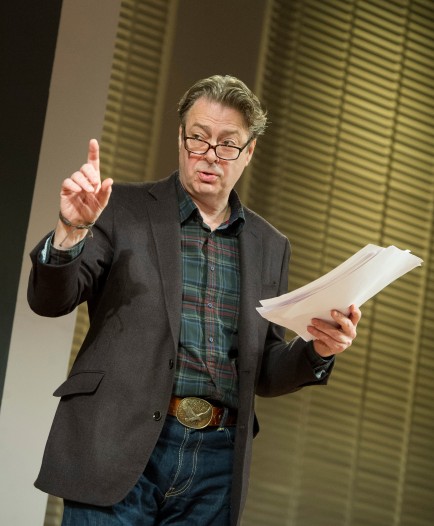You have no items in your cart. Want to get some nice things?
Go shopping
In Britain and America, the words “creative writing course” suggest different things. In the US, it suggests a college green in Iowa or New England, a dream factory where students struggle for publishing deals and self-actualisation. In the UK – despite the noble exception of the UEA and its satellites – it suggests a rickety hall at the University of the Third Age, or a five-day Shropshire retreat where the course leader has a “treatment in development”. So when Theresa Rebeck’s Broadway hit Seminar – set on a $5,000 creative writing programme – beamed down to the Hampstead Theatre stage from Planet MFA, we were sure to expect more heft and higher stakes than, say, Alan Ayckbourn’s Improbable Fictions (2005), a take on a local writers’ circle and its gallery of loveable eccentrics.
Seminar does have more heft than Improbable Fictions, though that’s not saying much; anything compared to Alan Ayckbourn is bound to come out favourably. In actual fact, it is pretty inconsequential; for its first half at least, it is essentially an episode of Friends with references to Jack Kerouac and Tobias Wolff.
The four students of the creative writing class – taught by Roger Allam’s scathing but charismatic Leonard – are a commedia dell’arte troupe of archetypes. Martin (Bryan Dick) and Katie (Charity Wakefield) are the Ross and Rachel of the group, he the intense one who has come from nowhere, she the entitled one having a crisis of confidence; Douglas (Oliver Hembrough), the tweed-jacketed blowhard, is the Joey. There’s also the ambitious Izzy (Rebecca Grant), fully aware of her sexual magnetism; her nearest analogue is Cassie, the beautiful cousin of Ross and Monica who, in season 7, reduces the men to salivating wrecks. Cue a lot of who’s-sleeping-with-who and who-really-belongs-with-who, plus a sizeable dose of apartment comedy. In its sexual themes, the first half brings to mind another British counterpart, David Lodge’s Writing Games (1990), in which a creative writing course is the backdrop to all manner of sexual hijinks. But while Lodge’s play was in the British farcical tradition, Seminar is American sitcom to the core: watch as Katie, depressed at the poor reception of her short story, gorges herself on ice cream and cookie dough in pure Rachel fashion, or Izzy, like Phoebe, flashes her chest for no apparent reason.
While frivolous, Seminar is never less than entertaining: like an episode of Friends, it is frothily enjoyable. This makes for a successful box set, or a good E4 scheduling decision; whether it makes for a successful play is another matter. In the second act, Rebeck grasps around for substance and wisely makes greater use of Leonard, the play’s main strength. Instead of being simply The One with the Creative Writing Class, Seminar becomes The One with Roger Allam.
Leonard, a novelist-turned-editor with a sideline in globetrotting magazine articles, is a withering dispenser of disdain. We virtually never see him sitting; he is always standing, strutting, scornfully tossing sheets to the ground as the students await his grand pronouncement. As only fictional creative writing tutors can, he can condemn a story based only on its first six words. Much like Wonder Boys‘ Grady Tripp, we are left to wonder why he is no longer the literary darling that he was, although Leonard has none of the depth of Chabon’s well-developed protagonist. In the first act, he is essentially a cartoon as he delivers his pithy decrees. In the second act, some effort is made to flesh him out, and the play’s themes with it. Rather than an NBC flatshare comedy, Seminar becomes a play about masculinity, testosterone one-upmanship in the literary world. As Katie remarks in a crucial line: “Boys, boys, boys. You just never get enough of yourselves, do you?” For the final 20 minutes, the set changes from Katie’s tasteful apartment, where the group meet, to Leonard’s, a virile realm of exposed brick and Jasper Johns prints – a microcosm of the trajectory of the play. The vital relationship turns out not to be the will-they-won’t-they of Martin and Katie, but the master-pupil dynamic of Leonard and the gifted (or so we are told) Martin. If Leonard is no Grady Tripp, then Martin is no James Leer; but their stormy bond, and underlying sense of surrogacy, at least prompts a greater interrogation of Leonard’s character. For all the play’s flaws, every second that Allam is on stage is a pleasure.
Allam’s is not the only deft performance. The cast as a whole are talented, in particular Charity Wakefield as Katie, the most fleshed-out of the students: there is a particular moment, as she says “I’m not so interested as I thought I was in being a writer”, when her voice cracks, encapsulating her character’s vulnerability. The only shortcoming of the acting is the use of American accents: some are better than others, but it initially grates. For the students, the accents are inevitable – but why should Leonard be American too? This represents the one dud decision of Terry Johnson’s direction. Overwhelmingly, the faults of Seminar are in the writing; the production is spot-on, from Colin Towns’s jazzy scene transitions to Lez Brotherston’s sociologically attuned design. That Leonard should be American, however, is baffling. When Alan Rickman first played the role on Broadway, he kept his English accent. This would have added an interesting layer to the play; Leonard becomes a jaded Englishman, impervious to the students’ American idealism. Here, Allam’s widely-remarked resemblance to literary exile Christopher Hitchens would have made the emigré angle all the more delicious – not least because of Hitchens’s own way with the dismissive put-down. The main justification to see Seminar is not the play but Allam. While he is excellent as ever, the accent is both a missed opportunity and an unnecessary fetter.
Seminar continues at the Hampstead Theatre until November 1. Tickets are from £12 to £32.

About Daniel Marc Janes
Daniel joined Litro in July 2013. He has previously contributed to the LA Review of Books, Little White Lies, the London Review of Books blog and the New Statesman's Cultural Capital.




